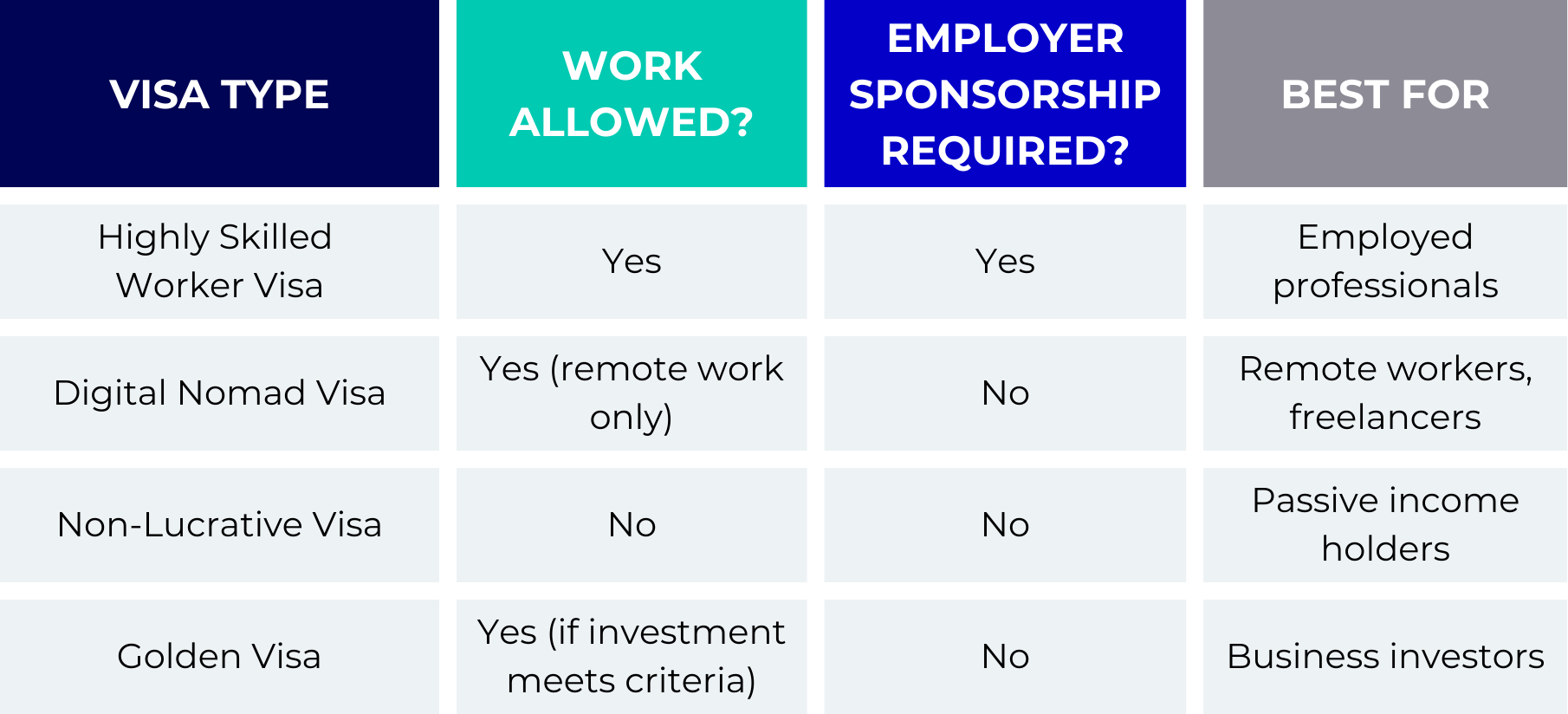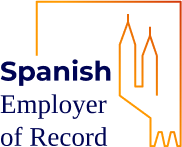18 March 2025
What are the best visa options for professionals relocating to Spain?
Spain offers a range of visa options tailored to professionals worldwide, making it an increasingly attractive destination for global talent. Whether you’re a highly skilled employee, a freelancer, or a remote worker, the right visa choice can open the door to long-term opportunities while ensuring compliance with Spanish immigration laws.
This article will explore the best available visa pathways, eligibility criteria, benefits, and restrictions. We’ll also examine how a Spanish Employer of Record (EOR) can simplify the relocation process and help professionals legally work in Spain.
Understanding Spain’s work visa landscape for professionals
Understanding Spain’s work visa landscape is crucial for professionals considering relocation. While EU and EFTA citizens benefit from the right to work in Spain without a visa, non-EU nationals generally need a work permit or visa before employment can begin. This distinction means that EU nationals face fewer administrative hurdles, while non-EU professionals must learn a more complex application process.
Choosing the right visa is not just about meeting the basic requirements. Professionals need to consider their employment status, the demands of their prospective employer, and their personal work preferences.
Some visas, for example, require employer sponsorship and are best suited to those with a firm job offer in Spain. Others allow more independence, such as the Digital Nomad Visa, which supports remote work without needing a local employer.
Selecting the appropriate visa is also critical for long-term work flexibility. Professionals should think about whether they plan to stay in Spain permanently or temporarily, the kind of work they will be performing, and the level of administrative and legal support they may require. By understanding Spain’s work visa landscape, professionals can ensure a smoother transition, compliance with local regulations, and a stronger foundation for their career in Spain.
Highly Skilled Worker Visa (Blue Card)
The Highly Skilled Worker Visa—commonly known as the EU Blue Card—is designed for highly qualified professionals, including executives, engineers, scientists, and specialists. This visa requires sponsorship from a Spanish employer, who must demonstrate that the position cannot be filled locally.
It offers numerous benefits, such as expedited residency processes, family reunification options, and a clear path to long-term employment. This is one of the most straightforward and advantageous visa options for professionals with a high-level job offer from a Spanish company.
Digital Nomad Visa
Remote work has surged in popularity, and Spain’s Digital Nomad Visa caters to professionals who work for foreign companies or as independent contractors. Unlike the Highly Skilled Worker Visa, this option does not require employer sponsorship, making it ideal for freelancers, consultants, and creatives.
In some cases, digital nomads may benefit from reduced tax rates under Spain’s Beckham Law. However, it’s important to note that this visa is not valid for employees of Spanish companies, and applicants must demonstrate they are fully remote.
Non-Lucrative Visa
The Non-Lucrative Visa is geared towards professionals who do not plan to engage in employment within Spain. Instead, it’s designed for individuals who can demonstrate sufficient independent income, such as retirees, investors, or freelancers relying on passive income streams.
While this visa allows for long-term residency and lifestyle relocation, it does not grant the right to work. It’s an attractive option for those seeking to enjoy Spain’s quality of life without taking up local employment.
Golden Visa (Investor Visa)
Spain’s Golden Visa offers a unique pathway for high-net-worth professionals and entrepreneurs. Applicants can obtain fast-track residency by investing in Spanish real estate, businesses, or government bonds.
The Golden Visa does not require a minimum stay in Spain, and it allows investors and their families to live and work in the country if the investment meets certain criteria. It’s a compelling option for those looking to combine business opportunities with the benefits of Spanish residency.
How to choose the best visa for your needs?
When deciding on the most suitable visa, it’s crucial to consider factors such as employment status, long-term residency goals, and tax implications. For example, if you have a job offer from a Spanish company and plan to live in Spain long-term, the Highly Skilled Worker Visa (Blue Card) may be the best fit.
If you’re a remote professional working for international clients, the Digital Nomad Visa offers the flexibility you need. The Non-Lucrative Visa could be the simplest solution for those with sufficient passive income and no immediate need for local employment. Meanwhile, the Golden Visa is an attractive option for investors seeking residency through substantial financial commitments. This table below will help you to understand visa types better:

How an Employer of Record can help professionals relocate and work legally in Spain?
Understanding the complexities of Spanish immigration and employment regulations can be challenging, especially for professionals unfamiliar with the local landscape. This is where an Employer of Record (EOR) comes into play.
An EOR serves as the legal employer for expats, handling work permits, employment contracts, payroll, and tax compliance. By partnering with an EOR, professionals can secure compliant employment in Spain without needing to establish a legal entity or manage the intricacies of local labour laws on their own.
For example, Lisa, a Canadian marketing manager, had been offered a remote position with a European tech company but struggled to determine the best visa option for her move to Spain. Without a local employer presence to sponsor her, she faced complex legal and tax requirements.
The company turned to a Spanish Employer of Record, which reviewed Lisa’s situation and recommended the Digital Nomad Visa. The EOR handled the paperwork, ensured compliance with Spanish regulations, and helped her secure the visa. Once in Spain, they continued managing her payroll and social security contributions, enabling Lisa to start her role and settle in smoothly.
This not only ensures compliance with Spanish regulations but also streamlines the relocation process, allowing professionals to focus on their work and new life in Spain.
Choose your visa
Spain offers diverse visa options for professionals, each tailored to different employment situations and long-term goals. From the flexibility of the Digital Nomad Visa to the investment-driven opportunities of the Golden Visa, the right choice can pave the way for a smooth transition into the Spanish workforce.
Contact us today, and the Spanish Employer of Record will provide a seamless solution for those looking to simplify the process and ensure full compliance. By choosing the right visa and leveraging EOR support, professionals can make their move to Spain as smooth and rewarding as possible.



